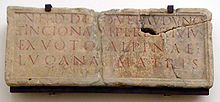- Veraudunus
-
Veraudunus war ein keltischer Gott aus dem Gebiet der Treverer. Er ist auf zwei Inschriften vom Widdenberg in Luxemburg bezeugt, auf denen er mit Inciona genannt wird.[1] Daher kann man annehmen, dass sie seine Begleiterin war. Auf einer bronzenen Votivgabe wird außerdem noch Lenus erwähnt[2], wobei nicht ganz klar ist, ob Veraudunus als Beiname benutzt wird oder ob beide als eigenständige Götter gesehen wurden.
Es kann sein, dass Veraudunus als personifizierter Widdenberg gesehen wurde, der damals möglicherweise den gleichen Namen trug. Dafür würde eine etymologische Ableitung sprechen, nämlich von gallisch *vero-dunon, d.h. „großer befestigter Hügel“[3], also die gleiche Herkunft wie die der französischen Städte namens Verdun. Ein anderer Vorschlag ist *vero-dunno, also „völlige Dunkelheit“.[4] Allerdings sind heute noch viele Toponyme mit dem Bestandteil *dunon „Befestigung“ bekannt, daher ist die erste Version wohl wahrscheinlicher.
Siehe auch
Liste keltischer Götter und Sagengestalten
Einzelnachweise
- ↑ H. Finke, Neue Inschriften, in: Bericht der Römisch-Germanischen Kommission 17, 1927, S. 1-107 und 198-231, Nr. 69: D[e]o Verauduno (Abbildungen); Charles Marie Ternes: Les inscriptions antiques du Luxembourg (IAL), in: Hémecht 17, 1965, S. 267–478, Nr. 136: Veraudun(o).
- ↑ IAL 136: [Le]no Marti Veraudun(o)
- ↑ Veraudunus in arbre-celtique.com (französisch)
- ↑ Veraudunus im Celtnet (englisch)
Wikimedia Foundation.

